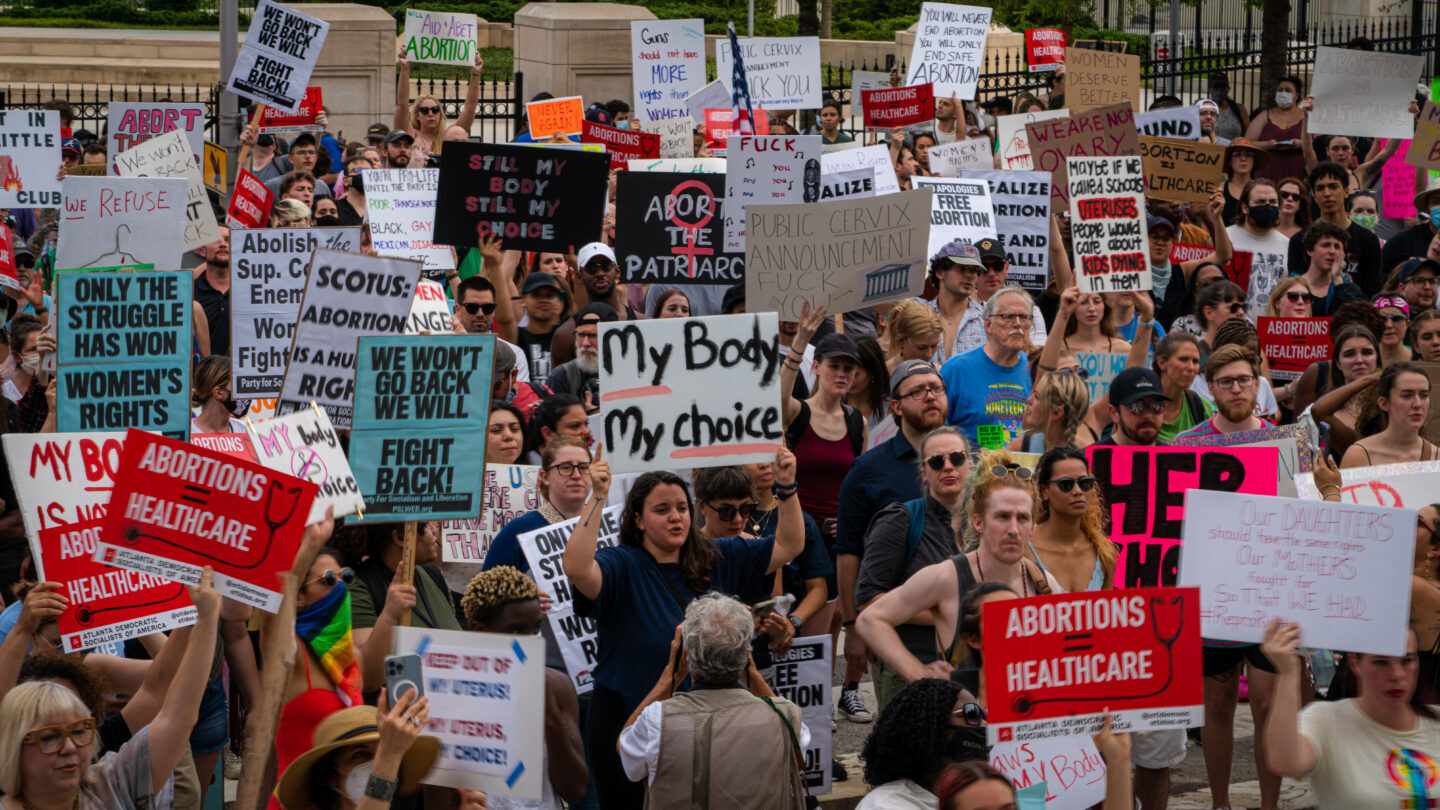Georgia Supreme Court upholds state's six-week abortion ban

This story was updated at 10:59 a.m.
Georgia’s law banning abortions at around six weeks of pregnancy will remain in place after a ruling from Georgia’s highest court on Tuesday.
The Supreme Court of Georgia has reversed a previous judge’s ruling that had found parts of Georgia’s abortion ban void from inception, allowing the law to stay in place and sending it back to a Fulton County court to consider other claims that were not addressed in this challenge.
The court’s majority opinion on the state’s House Bill 481, also called the Living Infants Fairness and Equality (LIFE) Act, holds that the trial court, “erred in concluding, based on since-overruled decisions of the United States Supreme Court, that the LIFE Act violated the U.S. Constitution when the Act was enacted.”
“The holdings of United States Supreme Court cases interpreting the United States Constitution that have since been overruled cannot establish that a law was unconstitutional when enacted and therefore cannot render a law void ab initio,” stated the majority opinion, authored by Justice Verda M. Colvin.
The majority opinion also said the trial court’s ruling “rests on a faulty premise — that, in Dobbs, the United States Supreme Court changed not only its interpretation of the United States Constitution but also the meaning of the Constitution itself,” saying this premise, “conflict[s] with well-established, foundational principles of law that are essential to our system of government.”
Presiding Justice Nels S.D. Peterson was disqualified from the case, and Justice Andrew A. Pinson did not participate.
“We are pleased with the court’s decision and will continue to defend the constitutionality of Georgia’s LIFE Act,” said Georgia Attorney General Chris Carr.
The decision marks the culmination of months of legal challenges over the ban, H.B. 481, which took effect about a month after the U.S. Supreme Court ruling that overturned Roe v. Wade abortion protections last year.
“Today’s ruling is not the end of this fight for women’s healthcare,” Andrea Young, executive director of the ACLU of Georgia, said in a statement. “Be clear, the right to abortion is on the ballot in 2024. Gov. Brian Kemp and the Georgia legislature acted to take away our rights. The Georgia legislature can restore our rights and we must organize to elect a pro-choice legislature.”
Kemp celebrated Tuesday’s ruling.
“I applaud Justice Colvin and the Georgia Supreme Court for ruling today that our written Constitution controls over judge-made law,” he said in a statement. “Today’s victory represents one more step towards ending this litigation and ensuring the lives of Georgians at all ages are protected.”
Republican state Sen. Ed Setzler of Acworth authored the legislation.
“I think it’s likely this bill will be upheld, even to subsequent legal challenges,” Setzler said. “And I think it’s sinking in now as a good, solid balanced law. I think that will continue for a number of years.”
H.B. 481 outlaws abortions at roughly six weeks of pregnancy, or when electrical activity is detected by ultrasound in the uterus.
The court heard oral arguments last March in the case, SisterSong v. State of Georgia, challenging the ban.
In court, attorneys with the ACLU, the Center for Reproductive Rights, abortion-rights groups and physicians argued the law was “void from inception,” saying it violates the state Constitution because it originally passed into law in 2019, when Roe was still in effect.
The plaintiffs argued the state legislature would need to pass another ban in order for the law to continue to stand.
On the other side, attorneys for Georgia Attorney General Chris Carr’s office argued that because Roe has since been overturned, the court should not retroactively invalidate the state’s 2019 H.B. 481 law based on a right that no longer exists.
At issue in the Georgia Supreme Court decision are Sections 4 and 11 of the 2019 H.B. 481, which criminalize abortion.
The U.S. District Court for the Northern District of Georgia ruled in 2020 that the ban was in direct conflict with then-binding U.S. Supreme Court precedent, including Roe v. Wade from 1973 and Planned Parenthood of Southeastern Pennsylvania v. Casey from 1992.
The court declared portions of Georgia’s ban were unconstitutional and permanently enjoined its enforcement.
Then, in 2022, the U.S. Supreme Court overruled Roe and Casey in Dobbs v. Jackson Women’s Health Organization, holding that the U.S. Constitution does not confer a right to abortion.
About a month after the ruling, the 11th Circuit Court of Appeals allowed H.B. 481 to take effect.
The SisterSong coalition filed a lawsuit seeking to block it on state constitutional grounds as the case moved forward, but failed.
The coalition also claimed certain provisions of the ban were unconstitutional and violated the due process, equal protection and inherent rights provisions of the Georgia state Constitution.
Fulton County Superior Court Judge Robert McBurney heard two days of arguments at a bench trial last fall to consider whether H.B. 481 was void from inception.
In November of last year, the judge issued an order declaring Sections 4 and 11 of the state’s abortion ban “void ab initio,” or void from the start and enjoining the state from enforcing them.
The court did not consider the merits of the plaintiffs’ constitutional claims.
The state of Georgia appealed, and the Georgia Supreme Court stayed the trial court’s order enjoining enforcement, allowing H.B. 481 to once again take effect as the lawsuit continued.
And the state Supreme Court heard oral arguments in the state’s appeal on March 28, 2023.
Dissent: 2019 law unenforceable
In a dissenting opinion, Supreme Court of Georgia Justice John Ellington wrote that he believes the 2019 Act is unenforceable under Georgia’s void ab initio doctrine, which is grounded in Georgia’s Constitution, because the Act was in violation of the U.S. Constitution when enacted.
“As the trial court correctly held, Section 4 of the 2019 Act was void when passed because its ban on most abortions after embryonic cardiac activity can be detected, which the parties agree occurs at approximately six weeks after a woman’s last menstrual period, would unduly interfere with a woman’s then-protected right under the United States Constitution to terminate a pregnancy before viability,” he wrote, and the reporting requirement in “Section 11 falls along with Section 4.”
Ellington’s opinion said the provisions of an act that is void ab initio can become effective only by reenactment.
“Were the Georgia General Assembly to pass new legislation restricting abortion, that post-Dobbs legislative action would not be subject to review under pre-Dobbs federal precedent,” he wrote.
“I freely concede that, after the United States Supreme Court overrules its own precedent interpreting the United States Constitution, Georgia courts must follow the United States Supreme Court’s most recent pronouncement on that Constitution’s meaning. But the General Assembly, under the Georgia Constitution, must also follow that Court’s most recent pronouncement on the United States Constitution’s meaning.”
The majority opinion countered the dissenting opinion, stating it, “fails to adequately explain why Georgia law permitted, much less required, the trial court to apply now-overruled Roe-era precedent.” Although “the dissenting opinion asserts that . . . Georgia law contains a constitutional ‘doctrine’ under which state courts must determine whether a statute was void ab initio based on ‘[b]inding decisional law’ that existed when the statute was enacted,” the majority opinion stated, “the dissenting opinion fails to cite any authority establishing the existence of such a doctrine.”
The winding path of House Bill 481
Before H.B. 481, abortion was legal in Georgia up to around 20 weeks of pregnancy.
When Kemp signed H.B. 481 into law, the coalition that includes the same plaintiffs as the 2022 legal challenge sued to stop it from going into effect and a federal district court soon blocked it.
Monica Simpson, executive director of SisterSong Women of Color Reproductive Justice Collective, said that Tuesday’s ruling was “devastating.”
“This abortion ban has forced Georgians to travel across state lines at great expense or continue the life-altering consequences of pregnancy and childbirth against their wills,” Simpson said in a statement. “In a state that already has OB-GYN deserts, one of the highest maternal mortality rates, especially for us as Black women, and cruel anti-trans legislation, this decision only further disregards us, our bodily autonomy, and our lives.”
“We have been resisting this ban that is steeped in white supremacy for years with our partners, and we are not backing down now,” she added. “We will continue to work to realize our vision for reproductive justice, in which everyone has the right to decide whether or not to have children and raise their children in safe, sustainable communities,”
Black women in Georgia are more than twice as likely as women of other races to die during and after pregnancy. And the state has one of the highest overall rates of maternal mortality in the nation.
It’s too soon to say whether the six-week ban has increased maternal mortality rates in Georgia.
But clinics that provide abortion services report H.B. 481 is having a dramatic impact, especially on patients whose ultrasounds show their pregnancies are beyond six weeks.
“I would say almost every day we have to turn a patient away because they’re measuring over the six, maybe they’re measuring at seven or maybe they’re measuring at eight,” said Aneisha Jacobs, a nurse practitioner and nursing supervisor at Feminist Women’s Health Center. “So we give them other clinics that they can go to out of the state of Georgia, which are going to be more north than us.”
In the first half of 2023, Georgia saw a 25% drop in the number of abortions compared to the same period in 2020, according to data from the abortion-rights group Guttmacher Institute.
In 2020, U.S. Centers for Disease Control and Prevention data show there were more than 37,500 reported abortions in Georgia, including 17% among out-of-state residents.
Anti-abortion activists want to see the numbers continue to go down.
The battles ahead
This summer, the Christian anti-abortion group Operation Save America, or OSA, held its annual national conference in Atlanta, drawing hundreds of protesters to the city.
They protested throughout the week outside of several Atlanta-area clinics that provide abortion, including A Preferred Women’s Health Center in Forest Park.
“OSA has chosen this area because of the fact that Georgia has become one of the battleground states on these issues, politically speaking, to provide awareness for the issues surrounding abortion,” said Josh Buice, pastor at Prays Mill Baptist Church in Douglasville, which hosted the gathering.
He said OSA is pushing for Georgia state lawmakers to prohibit all access to abortion.
That includes eliminating exceptions to the ban.
H.B. 481 allows some exceptions, including for ectopic pregnancy, miscarriage and pregnancies deemed “medically futile.” It also includes an exception for rape or incest –– but only after a police report has been filed.
Reactions to Tuesday’s decision have poured in from abortion-rights supporters and opponents.
“This is awful news for Georgians who are already struggling to access lifesaving reproductive healthcare,” Democratic state Rep. Ruwa Romman said. “With half our counties lacking an OBGYN and our state having one of the highest maternal mortality rates, this ruling threatens the life and wellbeing of Georgians.”
Earlier this year, Republican state House Speaker Jon Burns said he wasn’t planning to push additional action on abortion until the state Supreme Court issued a decision in the lawsuit over H.B. 481.
On Tuesday, the speaker released a statement.
“Georgia defends the sanctity of life and today’s ruling upholds our commitment to this noble goal,” he said. “I appreciate all those who supported the LIFE Act and continue to support families in our great state.”
But whatever happens at the state General Assembly during the upcoming legislative session that begins in January, legal battles over abortion access are likely to continue in Georgia.
And, said Georgia State University Assistant Professor of Law Anthony Michael Kreis, H.B. 481’s abortion restrictions are headed back to the state Supreme Court.
“There is a 100% certainty that this will go back to the Georgia Supreme Court. I don’t see any way in which the state would concede if they lost or that the plaintiffs here would not take this back up to the Georgia Supreme Court,” he said.
And the lower court could move relatively quickly.
Fulton County Superior Court Judge McBurney has already heard oral arguments, and his ruling on H.B. 481’s constitutionality could come within the next few months.
Kreis called Tuesday’s state Supreme Court procedural decision a “pit stop.”
“This is this is the first act of a two-act play for the Supreme Court of Georgia. And so the litigation will go on. And really the question that everybody wants answered, I think the question of does the Georgia Constitution protect in a fundamental way the right to an abortion, that’s the question that remains open.”
Rahul Bali contributed to this report.








